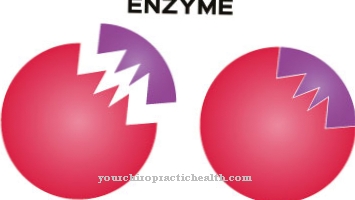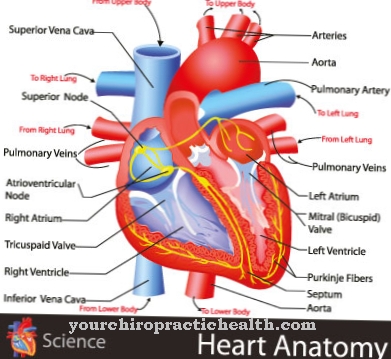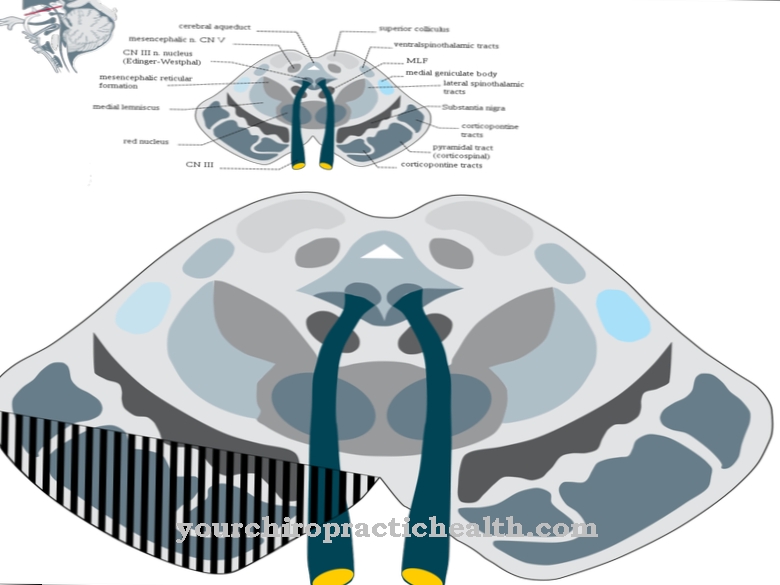The general, acute or chronic Vitamin deficiency - medically too Hypovitaminosis called - is a deficiency that can lead to numerous diseases. As an easily treatable deficiency situation, the vitamin deficiency can be remedied by oral administration of vitamins and a change in diet. All metabolic disorders caused by an acute or chronic vitamin deficiency can be completely cured with appropriate diet and therapy.
What is vitamin deficiency?
Vitamin deficiency is defined as the acute or chronic absence of the required vitamins in the organism. If the vitamin deficiency in one or more vital substances persists over a long period of time, it can lead to serious vitamin deficiency diseases such as scurvy, pellegra or beri-beri.
Vitamin deficiency can be defined by acute or chronic insufficient supply as well as by an incorrect combination of foods, impaired utilization of vitamins in the organism or increased consumption of vitamins - for example during chemotherapy or pregnancy.
causes
Given the free access to nutritional supplements and foods that are spiced up with synthetic vitamins, one should Vitamin deficiency actually be excluded in our latitudes. Deficits in the processing of industrially produced foods or a lack of vitamins in the case of a one-sided diet are now compensated for with "functional food" or vitamin preparations.
The fact is, however, that a general vitamin deficiency often occurs as a result of inadequate nutrition or a one-sided diet. Serious vitamin deficiencies are recorded in developing countries or in anorexia. In old age, insufficient food and fluid intake can lead to a latent vitamin deficiency. In industrialized countries, heavily processed food is increasingly causing a latent or acute vitamin deficiency to be diagnosed.
Most often, chronic vitamin deficiency is attributed to malnutrition, intake disorders, excess consumption during pregnancy or certain illnesses, certain illnesses or as a consequence of certain medical interventions or treatments. The organism counteracts an acute vitamin deficiency by making use of its depots or by registering hunger.
Most vitamins, however, have to be taken daily and cannot be stored in the body. The combination of various factors can also trigger a vitamin deficiency. Stress as a vitamin robber in connection with a one-sided diet low in vital substances is very likely to lead to a vitamin deficiency in the long term.
Chemotherapy can also cause a dramatic vitamin deficiency.Certain diseases - for example acute or chronic liver and kidney dysfunction, the relatively rare light allergy or diabetes - can trigger vitamin deficiencies.
Symptoms, ailments & signs
The signs of vitamin deficiency can be manifold. They develop according to the existing deficit. Certain signs are possible symptoms of multiple vitamin deficiencies. The time it takes for symptoms to appear varies depending on the vitamins. The physical and emotional reactions can range from simple symptoms of tiredness to dangerous cardiovascular problems, cancer or depression.
Changes in vision, especially at dusk and in the dark, can be considered as signs of a vitamin A deficiency. In addition, increased tiredness and susceptibility to infections as well as dry, flaky skin can develop. A lack of vitamin B1 can also cause fatigue, irritability, mood swings and forgetfulness.
An undersupply of vitamin B2 can lead to muscle weakness, depressive moods and poor fat burning. Too little B3 can lead to sleep disorders, skin problems and premature exhaustion. Symptoms of a vitamin B5 deficiency can include poor concentration, low blood pressure, headaches and dizziness.
It can also lead to cravings and muscle cramps. An insufficient supply of vitamin B6 can cause symptoms such as diarrhea, vomiting or loss of appetite. Sensory and movement disorders, confusion, nerve damage or breathing difficulties can occur due to a deficit in vitamin B12.
A deficiency in the main protective vitamin C can lead to reduced performance and susceptibility to infections. Too little vitamin D can cause stunted growth in children and overall increased tiredness and susceptibility to infections. A vitamin E deficiency can indicate muscle problems, accelerated skin aging and poor concentration.
Diagnosis & course
Depending on the cause, the diagnosis and course of Vitamin deficiency differently. But first of all, it has to be noticed. A vitamin deficiency is likely with chronic malnutrition or multiple chemotherapy, but not with apparently normal diet.
A general shortage of supply can go unnoticed for a long time. In addition, there can only be a lack of one vitamin or the absorption of vitamins can be disturbed for many reasons without it being noticed. Usually you only notice a vitamin deficiency in anemia, chronic fatigue, prolonged decline in performance, skin problems, circulatory disorders, night blindness, osteoporosis or other symptoms.
Newborn children can suffer from so-called neural tube defects, such as spina bifida, due to a maternal vitamin deficiency. They usually end with the death of the child. Rickets occurs when there is a lack of vitamin D, and scurvy when there is a lack of vitamin C. Both vitamin deficiency diseases are easy to deal with nowadays.
Complications
A vitamin deficiency can cause various complications. If the disease remains untreated for a longer period of time, this is initially noticeable as poor skin and cracked corners of the mouth, so-called rhagades. A deficiency in vitamins B5, B6 and B12 can cause anemia, which manifests itself among other things in excessive tiredness and exhaustion, concentration problems and an increased number of infections.
If a vitamin D deficiency is not compensated for, the risk of osteomalacia, a softening of the bones, which is associated with misalignments, chronic pain and other complications, increases. Furthermore, a vitamin deficiency can lead to secondary diseases such as scurvy, beri-beri, Korsakoff syndrome or anencephaly. Nerve pain and neurological failure symptoms can also occur.
A vitamin A deficiency can cause xerophthalmia, which in advanced stages can lead to the patient becoming blind. Pregnant women who are folic acid deficient run the risk of their child developing an open back. The effects of such spina bifida can be malalignment and muscle imbalances in the hip, knee and ankle area.
Spinal curvature occurs in around half of children. In the worst case, when treating a vitamin deficiency, symptoms of poisoning from dietary supplements can occur. An intravenous supply of the missing vitamins occasionally causes infections and injuries.
When should you go to the doctor?
If you experience tiredness, dizziness, and other signs of vitamin deficiency, a doctor is recommended. It may be due to a serious illness or the eating habits need to be adjusted under medical guidance. In any case, a vitamin deficiency should be clarified. With some vitamins such as vitamin B12 and vitamin D, the vitamin content in the body can be tested itself. Corresponding home tests are available from the pharmacy or the doctor. Individuals with an eating disorder are particularly at risk for vitamin deficiency. A deficiency also occurs quickly in older people and people with hemophilia.
Anyone who belongs to these risk groups or suffers from another disease should inform the doctor immediately if they have unusual symptoms. The right contact person is the family doctor or an internist. A psychologist should be consulted for mentally related eating disorders. The nutritionist creates a nutrition plan together with the patient and gives tips on how to improve everyday life.
A vitamin deficiency manifests itself through clear symptoms. Pallor and tiredness indicate anemia, which must be clarified quickly. Headache, dizziness and poor concentration are clear symptoms of deficiency. If they occur for more than a few days in a row, the doctor must be consulted. Parents who notice signs of vitamin deficiency in their child speak to the pediatrician.
Treatment & Therapy
Treatment of Vitamin deficiency is relatively easy. It can be successful by changing your eating habits. In the case of certain forms of illness as a result of a vitamin deficiency, it can be useful to take additional food supplements.
In order to prevent dangerous over or underdoses of certain vitamins, these should be done under medical supervision. With other vitamins, an excess is simply excreted.
If the vitamin deficiency is not due to diet-related deficits, but to organic diseases or absorption disorders, these must be treated.
prevention
For prevention Vitamin deficiency A varied diet rich in vital substances and containing all the important nutrients is sufficient. Well-known vitamin robbers such as white flour, sugar or stress should be reduced. Vitamin D can only be formed through sunlight, which is why daily exposure to fresh air makes sense.
Aftercare
A successfully treated acute hypovitaminosis does not require complicated follow-up care. If malnutrition or malnutrition causes the vitamin deficiency, the patient should develop new guidelines for general nutrition with a doctor or, even better, a nutritionist. It is essential to check compliance and effectiveness with regular blood tests in the laboratory.
A renewed drop in the stabilized vitamin store can thus be counteracted at an early stage and successful further treatment can be ensured. The healing of the dry and cracked skin typical of vitamin deficiencies can also be supported with topical creams applied to the appropriate skin areas. Usually, however, these side effects also regulate themselves just as quickly as the specific symptoms.
Symptoms caused by hypovitaminosis resolve completely and by themselves. As a rule, irreversible damage does not occur in industrialized countries like Germany. So apart from the follow-up check of the blood at regular intervals, no special follow-up measures have to be taken.
The prerequisite for this, however, is that the body's own vitamin stores have been completely refilled during the treatment. In principle, compliance with preventive measures, i.e. an optimized diet and lifestyle, is also the best aftercare.
You can do that yourself
In the event of a vitamin deficiency, the doctor should first be consulted. In addition, some self-help measures can be taken. A slight vitamin deficiency can be compensated for by changing your diet. Vitamin-rich foods such as fruit and vegetables should be on the menu. Lean fish, beans and whole grain products are also part of the diet, as these foods contain substances that support the body's absorption of vitamins.
In the case of a severe vitamin deficiency, dietary supplements must be taken. It is best to take it in consultation with the doctor in order to avoid an excess of vitamins and allergic reactions. In addition, care should be taken to ensure adequate sleep and rest. The body is usually very weak when there is a vitamin deficiency, which is why strenuous sporting activities should not be carried out. After a few weeks, the vitamin deficiency should be resolved. Those affected should have another medical examination to be sure.
After the deficiency has been compensated, you can go back to sports. Moderate physical activity stimulates the metabolism and contributes to the rapid absorption of vitamins. In addition, attention must be paid to any warning signals from the body. In the case of severe fatigue, cardiovascular complaints or depressive moods, there may already be a serious deficiency that must be treated by a doctor.



.jpg)
.jpg)
.jpg)





















